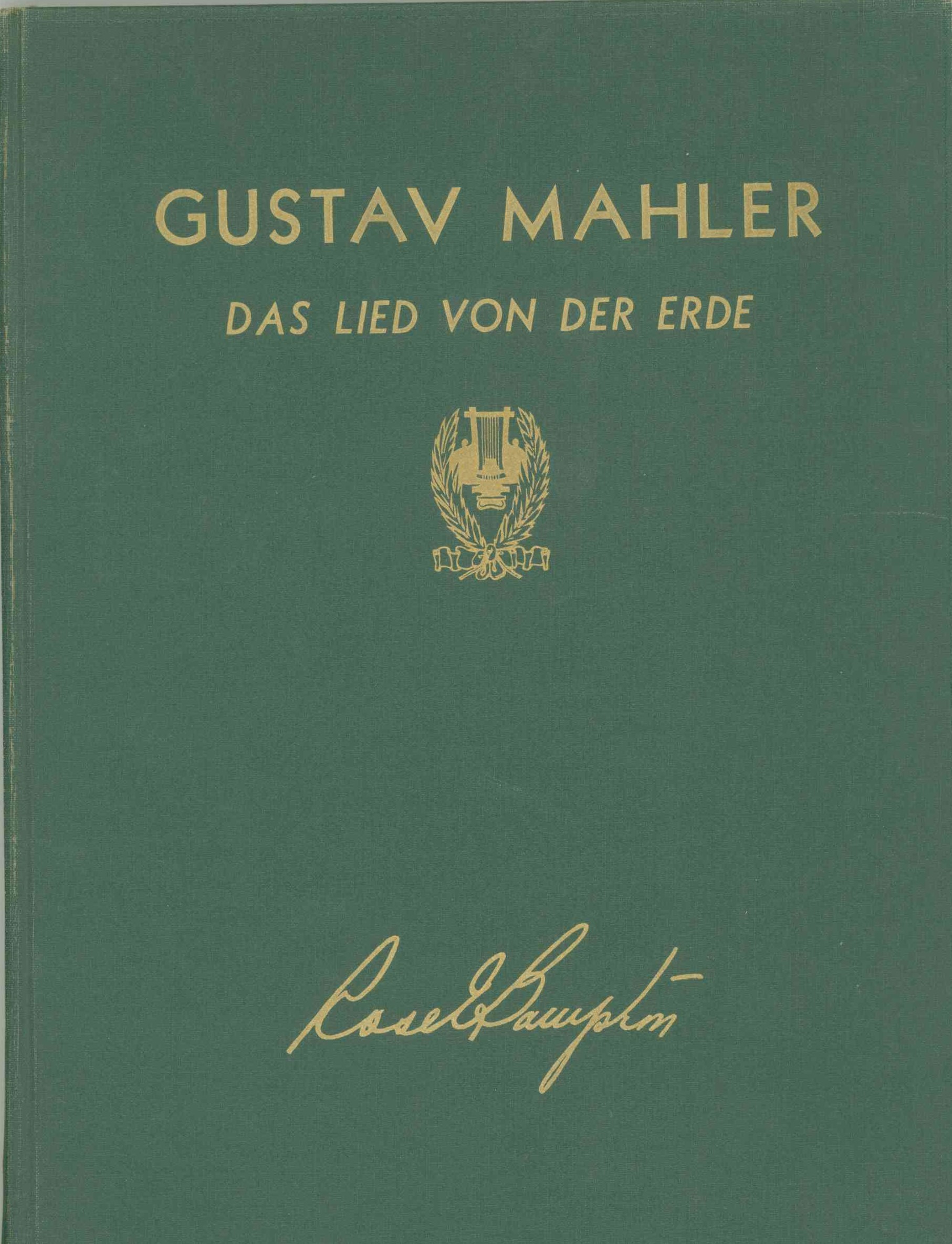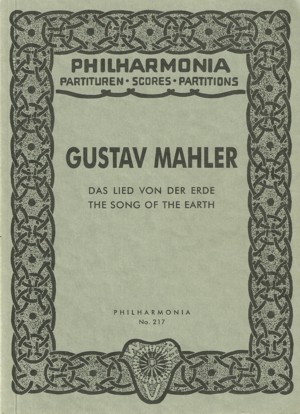Mahler: Das Lied von der Erde
Gustav Mahler's great Symphony / Song Cycle, Das Lied von der Erde, falls between his great vocal Symphony no. 8 and the purely instrumental Symphony no. 9.
Overall, I view this work more as an orchestrated song cycle rather than a symphony. I hear Mahler continuing a fine tradition from Schubert's Lied, yet making it his own. From this perspective, the work follows in the footsteps of Des Knaben Wunderhorn; even the revolving soloists reminds me of that work.
With this in mind, here Mahler outdoes himself co-mingling voice with orchestra. Obviously, the voice carries the brunt of declaiming the text, however, Mahler weaves instruments and voice very closely, often interacting as Schubert would have them do with voice and piano in his Lied. A combined force, each with important roles, rather than opposing or subjugated importance.
 Yet, as wild as it seems, Das Lied von der Erde
doesn't stray too far from the Eighth Symphony to my mind either. The
work is divided into two large parts, much like the preceding symphony.
30-minutes of five songs set in nostalgic recollection of earthly
delights, and one 30-minute movement collecting oneself at the end of
the journey.
Yet, as wild as it seems, Das Lied von der Erde
doesn't stray too far from the Eighth Symphony to my mind either. The
work is divided into two large parts, much like the preceding symphony.
30-minutes of five songs set in nostalgic recollection of earthly
delights, and one 30-minute movement collecting oneself at the end of
the journey.I use the term journey a lot when discussing Mahler's symphonies, both motivically and structurally. He achieves, where few others do, I think, a successful marriage of thematic structure and holding the emotional state of the listener hand in hand.
Musically speaking, as I mentioned with the 8th Symphony where I detected modernist traits carried over from Mahler's 7th, my thoughts carry over into this work too. The chamber nature of the orchestration, with a particular pungency of winds, reminds me of what will flourish in the 20th Century, perhaps in harsher terms than Mahler, but there nonetheless. Yet there is still more than enough room for Mahler's penchant for soaring, late Romanticisms.
 Generally speaking, I spend no time in my head debating philosophy. Discussions of objectivity vs subjectivity bore me to tears. I leave spirituality and mysticism to greater minds than my own.
Generally speaking, I spend no time in my head debating philosophy. Discussions of objectivity vs subjectivity bore me to tears. I leave spirituality and mysticism to greater minds than my own.
What does this have to do with Mahler? The more I read about the composer, the more I realize how much he questioned the nature of existence, consciousness, and the struggle of man toiling amidst their personal minutiae vs. the freedom of nature's spirit on its rounds.
I, on the other hand, am rarely inquisitive of my existence, but instead place myself upon a spectrum spring-boarding on the passions of others who do nothing but question. That is, I let others do the deep thinking and proselytizing, and based on the degree of agreement or disagreement, find my place in the world without much concern otherwise.
So it is with music. I am very much a clinical listener. I am interested in musical structures, harmonic movement, and color combinations, but rarely am I looking for an emotional experience. Once in a while, however, an emotion will push itself upon me while listening to music unbidden (look at the subtitle of this blog), but generally I view music as a process, even if I am in a minority.
Das Lied von der Erde is a very personal piece of music, and as in Mahler's other poetically-based works, whether instrumental or vocal, examines his place in eternity. The work doesn't completely lose me in thought and emotion, but its intent is certainly focused on both.
By the conclusion of Das Lied von der Erde, I am exhausted, where the final pages have done their job; they leave me emotionally drained and musically satisfied. The hallmark of a fine musical craftsmanship.So my examination of Das Lied von der Erde is more of a personal one than an historical or musical one. It makes me face what I so actively avoid; looking at the lives around me, examining my belief structure, searching for harmony within the natural world and the nature of man, or at least these ideas set musically.
What do you receive from listening to a work such as this? I am not a deep thinker, so I do not have a personal answer as of yet. What I can say is, the fact the Earth goes on and on, with or without me, is satisfying, and the final moments of Mahler's work puts my life in perspective and my soul at ease.
Hopefully you too!
1970: Bavarian RSO, Kubelík
2013: Netherlands PO, Albrecht
For now, we will have a very basic list of Mahler reviews above. The current list covers the most recent spate of listened recordings, not necessarily the best or most worthwhile. The older recordings are from our collection but newly reviewed, and the newer recordings represent recordings which were recommended to me. Until we at The Oozy Channel Keep have gotten ourselves up and running, this should suffice and we can reorganize the page a little more coherently in the future.

